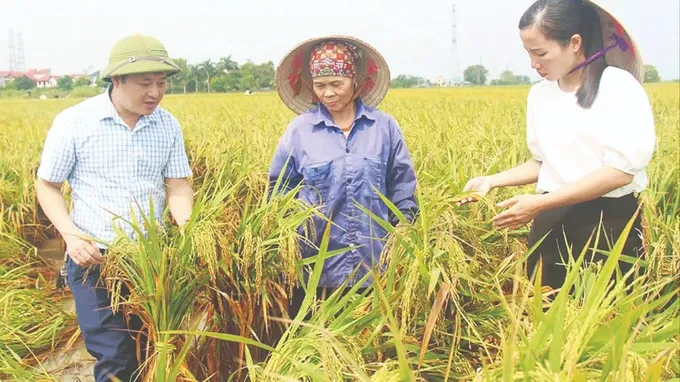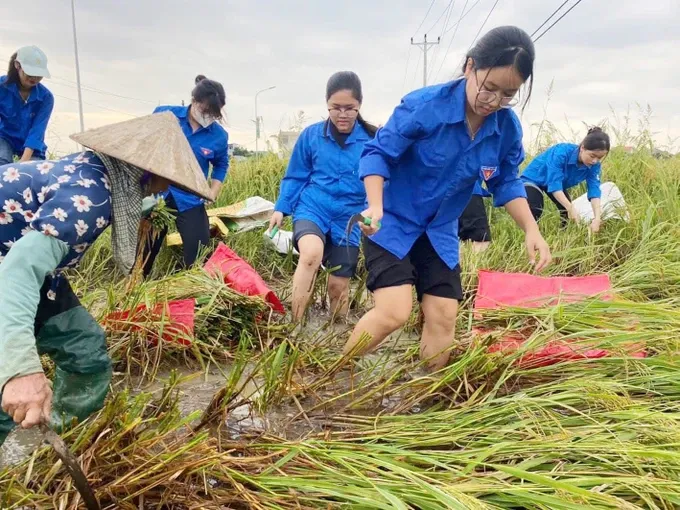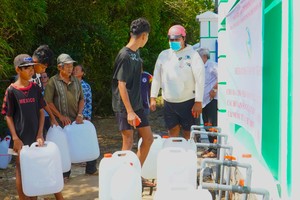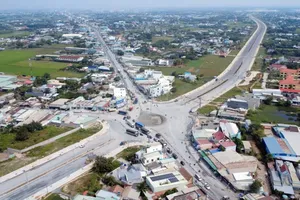
In Tuyen Quang Province, although floodwater has receded, many fields remain submerged in mud, and crops have been devastated. Over 20,200 houses have been damaged, 5,400ha of rice and 3,400ha of corn have been destroyed, and nearly 1,000ha of fruit trees have suffered significant losses. Director Nguyen Dai Thanh of Tuyen Quang Province Department of Agriculture and Rural Development reported that the total damage amounts to over VND1.3 trillion (US$52.7 million).
To address this, the department has implemented support measures for farmers, such as land leveling, water level adjustment, weed removal, and disease prevention. Farmers are urgently cleaning their fields and replanting damaged or dead crops. However, the workload is immense, requiring timely and effective support.
Despite not being directly in the typhoon's path, Thai Binh Province also suffered severe damage. In Dong Xuan Commune of Dong Hung District, the Cua Chua field was inundated, resulting in the complete loss of approximately 30 percent of farmer Vu Tien Tham's rice crop. Heavy rains flooded thousands of hectares of winter-spring rice in Tien Hai and Quynh Phu Districts, causing losses of 20-70 percent. Head of the Quynh Phu District Division of Agriculture and Rural Development stated that the district is actively assisting farmers in recovering from the damage and adjusting production plans.
Hai Phong City has reduced non-essential tasks to prioritize recovery and production restoration. The Department of Construction here is implementing emergency repair procedures, while the Department of Labor, Invalids, and Social Affairs is taking care of affected workers.
The Hai Phong City Party Committee has directed the implementation of suitable solutions to support affected farmers and businesses. The Vietnam Bank for Social Policies will increase entrusted capital to support businesses and households in accessing low-interest loans and will also consider debt restructuring and extensions for those who have suffered severe losses.
With only about four months until the Lunar New Year, localities that have recently experienced storms and floods, such as Bac Giang, Tuyen Quang, Yen Bai, Phu Tho, Thai Nguyen, Hai Duong, and Nam Dinh, are racing to recover from natural disasters and restore production.
In Tuyen Quang Province, after the floods, officials have guided farmers to restore crops by leveling land, adjusting water levels, and removing weeds. For vegetables, it is necessary to dig trenches to drain water quickly. Farmers in Thai Binh Province are assisted with pesticides to prevent diseases and new seeds as well as necessary supplies to resume agricultural activities.
Recently, the Ministry of Agriculture and Rural Development has organized numerous working groups to visit disaster-stricken provinces in the north to assess damages and direct recovery solutions. Deputy Minister Phung Duc Tien of Agriculture and Rural Development requested that the concerned localities improve farmlands, orchards, and infrastructure, and simultaneously prepare seedlings and livestock to restore production.
He also directed the provinces of Thai Nguyen, Tuyen Quang, Yen Bai, Phu Tho, and Bac Giang promptly summarize their needs to request timely support from the government and ministries, including livestock, crops, and fisheries. The Ministry of Agriculture and Rural Development is committed to supporting localities so that farmers can quickly stabilize production and restore their income.

Statistics from the Ministry of Agriculture and Rural Development revealed that as of September 18, Typhoon No. 3 had affected approximately 312,000ha of various crops. Among this, 200,000ha were rice, 51,000ha were vegetables, and 61,000ha were other crops.
Given this significant damage, it is urgent to prepare agricultural materials and crop seeds (especially rice seeds) to ensure timely planting seasons and production recovery. Therefore, on September 18 in Hanoi, Deputy Minister Hoang Trung of Agriculture and Rural Development chaired a meeting on crop restoration and agricultural reproduction after the storm and floods.
The Plant Protection Department reported that to ensure timely planting for the 2024-2025 winter-spring crop, localities urgently need 15,000 tonnes of rice seeds, 112 tonnes of vegetable seeds, and 980 tonnes of corn seeds. Currently, the national reserve has over 4,100 tonnes of rice seeds, 250kg of vegetable seeds, and over 257 tonnes of corn seeds, ready to meet the demand.
In the meeting, several businesses and associations committed to supporting farmers in regions devastated by recent typhoons. Companies like ThaiBinh Seed, Binh Dien Fertilizer, and Vinaseed have pledged to provide essential resources such as seeds, fertilizers, and financial aid to help farmers recover and resume agricultural production.
Deputy Minister of Agriculture and Rural Development Hoang Trung commented that the severe damages caused by Typhoon No. 3 require the joint support of businesses and associations to address. However, localities also need to clearly identify what people truly need.
The Ministry of Agriculture and Rural Development is coordinating with localities to understand the actual needs of each locality, ranging from seed types and agricultural materials or equipment. Based on that, this ministry will make a list so that businesses can distribute directly to the destination with the goal that money and goods will reach the hands of the people most effectively and efficiently.
The Ministry of Agriculture and Rural Development has also assigned the Crop Production Department to fully record and appreciate the contributions of businesses, then plan specifically for each locality, balancing according to the needs of each locality to invite businesses and representatives of the Ministry of Agriculture and Rural Development to go and support each of them.













)










